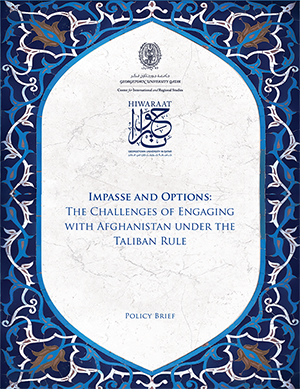Impasse and Options: The Challenges of Engaging with Afghanistan under the Taliban Rule

By Hameed Hakimi, an Associate Fellow at Chatham House and a Senior Fellow at the Atlantic Council
The resurgence of the Taliban in Afghanistan following the withdrawal of U.S. and NATO forces in August 2021 has significantly altered the geopolitical and social landscapes of the region. This policy report delves into the complexities of engaging with the Taliban-led Afghanistan and provides actionable recommendations for policymakers to navigate this challenging terrain. With the return of the Taliban to power, a new chapter in Afghanistan’s history has begun, characterized by both renewed uncertainty and the potential for recalibrated international relationships.
This paper draws impetus from the “Afghanistan Regional Symposium: Confronting the Impasse,” a two-day event hosted by the Center for International and Regional Studies (CIRS) at Georgetown University in Qatar (GU-Q) in November 2023 as part of the Hiwaraat conference series. To explore the challenges surrounding Afghanistan and its region, with a core aim of encouraging solution-oriented thinking, the symposium comprised a high-level closed-door policy roundtable alongside public panel discussions, featuring experts, scholars, and civil society actors. The symposium and this policy brief are part of CIRS and GU-Q’s unwavering commitment to fostering a nuanced understanding of the pressing challenges confronting Afghanistan, the region, and international policymakers. The primary goal is to make meaningful contributions towards informed, practical, and impactful steps that advance peace and stability for Afghanistan and beyond.